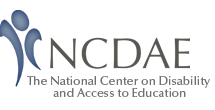The Potential of Implementing Web Accessibility into the Accreditation Process—An NCDAE/WebAIM Initiative
The Need
The Internet is a crucial part of higher education today. Students, faculty, and staff must have access to institutional web content for many essential activities such as registering, applying for financial aid, completing assignments, employment, testing, and delivering or augmenting courses. However, if websites that provide necessary information are not accessible, those with disabilities may not be able to independently complete their daily tasks or compete with their peers in academia and beyond.
Recent lawsuits and new legislation are providing additional motivation for institutions to ensure that their websites are accessible to all. While an understanding of the need for accessibility is growing, most institutions struggle to find ways to achieve and maintain it. Furthermore, the decentralized nature of most postsecondary institutions adds an additional layer of complexity to the problem. The most accessible webpage in the world is still inaccessible if a user with disabilities must navigate inaccessible pages to get to it.
To achieve institution-wide web accessibility, systemic change is needed. Top level leadership and guidance is essential to promote the institution-wide changes necessary to address and maintain web accessibility in postsecondary institutions.
Read more about the Need and significance of the problem.
The GOALS Project
Recognizing this need, NCDAE is proud to lead a grant effort sponsored by the Fund for the Improvement of Postsecondary Education (FIPSE). The project, Gaining Online Accessible Learning through Self-Study (GOALS) will capitalize on the products of an existing GOALS project and focus on motivations of top administrators to choose to engage in self-study and continuous improvement on web accessibility. This information will then help the GOALS partners to create blueprints that will help promote adoption of institutional web accessibility in higher education.
One set of blueprints will focus on aligning institutional web accessibility with regional accreditation. The GOALS Consortium will identify ways in which web accessibility is, or could be, expressed in regional accreditation materials; create new materials with consortium partner Southern Association of Colleges and Schools – Commission on Colleges (SACSCOC); and create materials and processes to assist review committees in assessing institutional web accessibility.
A second set of blueprints will help support institutional adoption of web accessibility and to support institutions that wish to engage in the GOALS self-study process. These materials will focus on developing workshops, training materials and templates that institutions can use to evaluate and improve web accessibility across their web presence. As part of this blueprint GOALS will build upon and promote the use of materials and processes developed through an earlier FIPSE grant. These materials include: an Action Paper designed to raise their awareness of web accessibility, emphasizing the need for leadership to make it happen; a document of Institutional Indicators that outlines recommended practices to achieve institution-wide web accessibility in postsecondary education; and a web-based Web Accessibility Benchmarking and Planning Tool to assist institutions in assessing, planning, tracking and improving institutional infrastructure to support web accessibility. A final objective of this blueprint will be to develop and conduct a cost and economic resource analysis of web accessibility to assist institutions in understanding the costs and benefits associated with including web accessibility into initial development and in retrofitting existing websites.
The GOALS 6-member Consortium, is led by the National Center on Disability and Access to Education (NCDAE) at Utah State University, and includes: Michigan Community College Virtual Learning Collaborative (MCCVLA); Southern Association of Colleges and Schools – Commission on Colleges (SACSCOC); Southern Regional Education Board (SREB); Western Interstate Commission for Higher Education (WICHE); and WebAIM– Keeping Web Accessibility in Mind.
In these efforts, NCDAE will be working with our consortium partners in the development and dissemination of materials and information as well as in the recruitment of 45 field test and case study sites. If you are interested in learning more about Project GOALS or would like to participate as a field test site as we develop new materials, please contact us through our website or email Cyndi Rowland at cyndi.rowland@usu.edu.


